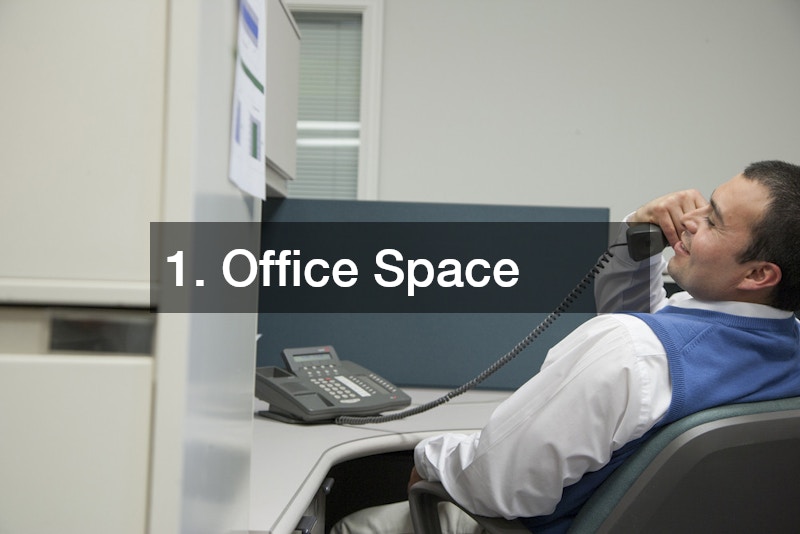In the modern business landscape, managing office expenses effectively and efficiently is crucial for the sustainability and growth of any company. With a myriad of components contributing to the overall expenditure, understanding the intricacies behind each aspect is essential. This article will explore various infrastructure needs and their associated costs, delving into topics such as office space, commercial garage repairs, and weatherproofing, among others. By examining these areas, businesses can better comprehend what are office expenses, allowing for more informed financial decisions.
The article will commence with an analysis of office space, focusing on office cubicles and the importance of efficient space utilization. It will then transition into a discussion on commercial garage repairs, emphasizing the significance of maintaining functional garage doors. An exploration into weatherproofing solutions, such as hurricane windows and doors, will highlight the benefits of safeguarding properties against natural disasters. Further sections will address paving services like road striping, essential for maintaining external infrastructure.
Continuing from there, the article will explore the practical aspects of providing adequate restrooms, including portable solutions. The focus will then shift to business storage options, including insights into livestock trailer sales. Property fencing will also be discussed, emphasizing the durability and aesthetics of aluminum fences. The role of item surveyors, such as yacht surveyors, will be outlined, showcasing their importance in asset management. Finally, exterior updates and pest control measures will be examined, with particular attention given to aesthetic enhancements like concrete brick stamp patterns and essential wildlife exclusion strategies.
1. Office Space

Office spaces are integral to the day-to-day operations of any business, and having the right layout can significantly affect productivity. Office cubicles offer a practical solution for creating individualized work areas while maximizing space efficiency. They help in organizing the office environment and can be tailored to meet specific business needs. Understanding what are office expenses related to office space is crucial, including rent, utilities, and maintenance, which form a substantial part of the operational budget.
Cubicles can be cost-efficient compared to private offices, providing each employee with a personal workspace without incurring high costs. To balance the cost and functionality, businesses often need to consider both the upfront costs and the long-term benefits of these spaces. This involves evaluating the initial investment against potential increases in productivity and employee satisfaction.
Organizations are continuously exploring ways to optimize their office environments. This includes integrating technological advancements and ergonomic furniture to enhance employee well-being and efficiency. By carefully considering these factors, businesses can better manage what are office expenses related to office space, ensuring an optimal working environment that supports their strategic goals.
2. Commercial Garage Repairs
Commercial garages play a vital role in supporting operational activities, particularly for businesses involved in logistics and transportation. Ensuring the functionality of these spaces through regular commercial garage door repairs is essential. These repairs not only guarantee security but also streamline the workflow by minimizing disruptions caused by faulty equipment. Understanding what are office expenses associated with these repairs can help in budgeting appropriately.
Regular maintenance of commercial garage doors can prevent costly breakdowns and extend the equipment’s lifespan. Businesses must budget for both preventive maintenance and unexpected repairs, all of which contribute to what are office expenses. Neglecting these expenditures can lead to more significant issues, impacting operational efficiency and safety.
By working with professional repair services, businesses can ensure that their garage doors are always in optimal condition. This partnership can also aid in managing costs through timely interventions, thus helping businesses maintain smooth operations. Thorough planning and proactive management of commercial garage repairs are critical steps in minimizing disruptions and controlling expenses.
3. Weatherproofing
Weatherproofing is a crucial aspect of building maintenance, particularly in areas prone to extreme weather conditions. Installing hurricane windows and doors is a proven method to safeguard properties against natural disasters. These weatherproofing solutions not only protect against damage caused by storms but also offer added security and improved energy efficiency, impacting what are office expenses of maintaining a building.
The initial investment in hurricane windows and doors can be substantial; however, their long-term benefits often outweigh the costs. They can significantly reduce repair expenses caused by adverse weather and potentially lower insurance premiums. Additionally, improved insulation provided by these solutions can reduce heating and cooling costs, further contributing to the management of what are office expenses.
Companies should evaluate their geographic risks and assess the most effective weatherproofing measures for their properties. Incorporating these solutions into their infrastructure strategy can lead to substantial savings, both in terms of damage control and operational efficiency. Ultimately, investing in weatherproofing is a prudent financial decision for businesses focused on reducing risk and managing their office expenses.
4. Paving Services

Proper maintenance of external infrastructure is essential for any business, contributing to both aesthetics and functionality. Services such as road striping are vital in ensuring that parking lots and driveways remain accessible and safe for employees and customers. Clear and professional road striping can enhance traffic management and reduce the risk of accidents.
Investing in quality paving services can have a notable impact on what are office expenses, as well-maintained premises can attract more clientele and provide a positive first impression. It’s important for businesses to consider the long-term benefits of regular paving maintenance, including cost savings from reduced accident liability and damage repair. Integrating these expenses into the overall budget strategy ensures a balanced approach to business expenditures.
Regular assessments of paving conditions allow businesses to address issues before they escalate, minimizing potential liability. Partnering with reliable service providers for road striping can guarantee high standards and timely completion. Carefully managing these expenses is crucial for sustaining a professional and safe business environment.
5. Restrooms
Ensuring that restrooms are adequately equipped and accessible is an essential consideration for businesses, impacting both employee comfort and client perceptions. In situations where permanent facilities are infeasible, portable restrooms offer a practical solution. They provide the necessary convenience and functionality, especially for temporary projects or events.
When assessing what are office expenses, businesses must include the costs associated with renting, maintaining, and servicing restrooms. Portable restrooms can be a cost-effective solution compared to constructing permanent facilities, especially for short-term needs. Incorporating this flexibility allows businesses to allocate resources more efficiently and respond promptly to evolving demands.
Portable restrooms can also reduce the need for significant infrastructure investments, proving advantageous for business operations in remote locations. Evaluating the specific requirements and tailoring restroom solutions accordingly helps maintain hygiene standards and staff satisfaction while effectively managing expenses. This approach is a practical measure towards balancing functionality with cost efficiency in office expenses.
6. Business Storage
Business storage solutions are crucial for maintaining organizational efficiency and safeguarding assets. As businesses grow, identifying adequate storage options becomes imperative, with livestock trailer sales offering viable solutions for specific needs. Consideration of storage space is an integral component when exploring what are office expenses.
Livestock trailer sales can offer solutions for businesses dealing in transporting goods or equipment, ensuring secure storage and mobility. This option allows flexibility and versatility in adjusting to varying storage demands, especially for companies operating in dynamic environments. Choosing the right storage method can enhance operational capabilities and support long-term business growth.
Understanding the full spectrum of potential storage expenses enables businesses to plan and allocate resources strategically. An informed decision in selecting appropriate storage solutions can mitigate unnecessary spending and improve asset management. Storage considerations are essential in crafting an efficient and cost-effective operational strategy.
7. Property Fencing

A key consideration for businesses is ensuring the security and aesthetic appeal of their premises through proper fencing. An aluminum fence is a popular choice due to its durability and low maintenance. It offers a clean, professional look while providing necessary security, impacting what are office expenses through its long-lasting robustness.
Aluminum fences are known for their strength and resistance to corrosion, making them suitable for various environmental conditions. Their longevity can translate into fewer replacement costs and lower maintenance requirements, which is advantageous for budget planning. Businesses can thus leverage these qualities for more sustainable expenditure management.
When considering fencing options, businesses should assess factors like installation costs, potential need for repairs, and overall impact on property value. Investing in quality fencing is a strategic measure that complements the security infrastructure while delivering substantial long-term savings. This choice underscores the broader aim of managing office expenses efficiently.
8. Item Surveyors
In asset management, the role of item surveyors is vital, with yacht surveyors being a pertinent example. These professionals conduct assessments to determine the condition and value of assets, providing insights essential for financial and strategic planning. Understanding the expenses associated with hiring item surveyors contributes to comprehensive management of office costs.
Yacht surveyors, for example, play a critical role in ensuring high-value assets are maintained and protected. Their expertise can prevent unforeseen depreciation and ensure compliance with safety standards, which is crucial for businesses engaged in asset-intensive operations. Valuation expenses, part of what are office expenses, become a proactive strategy in safeguarding investments and ensuring long-term fiscal stability.
Regular asset assessments by qualified surveyors can provide businesses with detailed insights into the condition and potential risks associated with their holdings. This proactive approach helps in avoiding costly repairs or losses, supporting more informed financial decision-making. Item surveyors thus represent a crucial investment in preserving asset value and managing office expenses effectively.
9. Exterior Updates
Maintaining a business’s appearance is vital both for branding and attracting potential clients, making exterior updates an essential component of infrastructure management. Concrete brick stamp patterns are an innovative way to enhance aesthetic appeal without substantial renovations. This technique can refresh a building’s exterior while influencing what are office expenses through its cost-effectiveness.
Concrete brick stamp patterns provide a visually appealing finish that mimics traditional brickwork, yet it requires less maintenance and is more affordable. Businesses can benefit from these enhancements by presenting a modern and professional appearance to visitors. Carefully implementing these updates can result in considerable savings while still achieving desired aesthetic outcomes.
The choice of exterior finishes and updates should align with company branding and architectural goals. Balancing aesthetics with budgetary constraints is crucial when planning such enhancements. By focusing on practical yet effective updates, businesses can manage costs strategically while significantly improving their premises’ visual appeal.
10. Pest Control

Pest control is a critical component of facility maintenance, influencing not only health and safety but also financial responsibilities. Wildlife exclusion is a key preventative strategy to avoid the intrusion of unwanted animals, reducing damage and contamination risks. What are office expenses can significantly increase without effective pest management considerations.
Employing wildlife exclusion techniques ensures buildings are safeguarded against potential pest-related issues. This involves sealing entry points, using deterrents, and maintaining cleanliness—measures that collectively minimize pest invasions and associated repair costs. Integrating these practices into routine maintenance schedules optimizes expenditure and prevents unanticipated financial burdens.
Regular assessments and partnerships with professional pest control services can enhance the effectiveness of these measures. Consistent application of exclusion techniques and rapid response strategies can sustainably decrease related expenses, contributing to healthier and more cost-effective business practices. Ultimately, proactive pest management is crucial for maintaining operational integrity and managing office expenses judiciously.
Understanding what constitutes office expenses within these various aspects can significantly impact a company’s financial health. By examining each element—from office space to exterior updates—businesses can identify opportunities for efficiency and cost savings. Proper infrastructure management involves strategic planning and informed decision-making to balance quality with expenses.
Adaptability and proactive management empower businesses to navigate the complexities of operational expenses. By focusing on strategic investments and regular maintenance, companies can mitigate risks and optimize resources effectively. This approach not only sustains operational capabilities but also supports long-term commercial success.
Businesses must maintain vigilance in reviewing and managing these expenses to adapt to dynamic market conditions. By prioritizing sustainability and efficiency, they can ensure robust financial management that aligns with their strategic objectives. In essence, a comprehensive understanding of office expenses and infrastructure needs is foundational to achieving organizational resilience and growth.